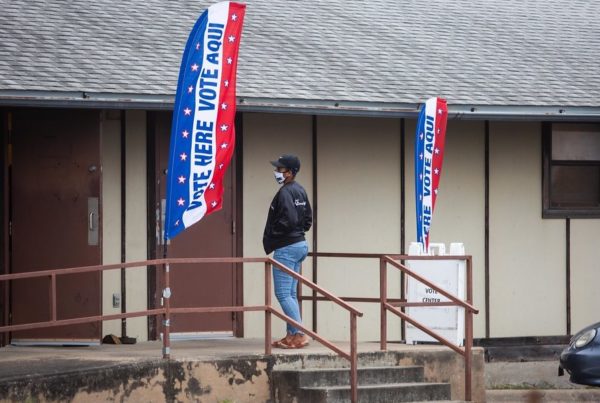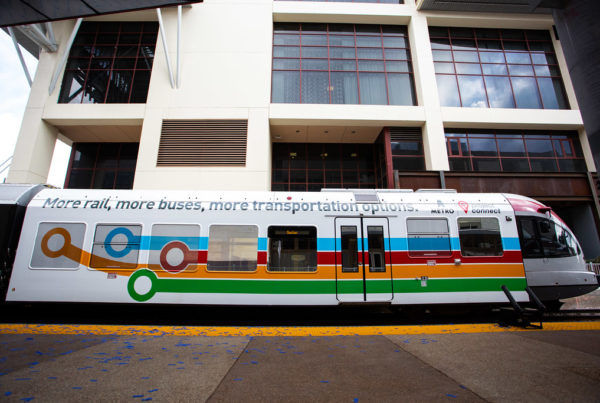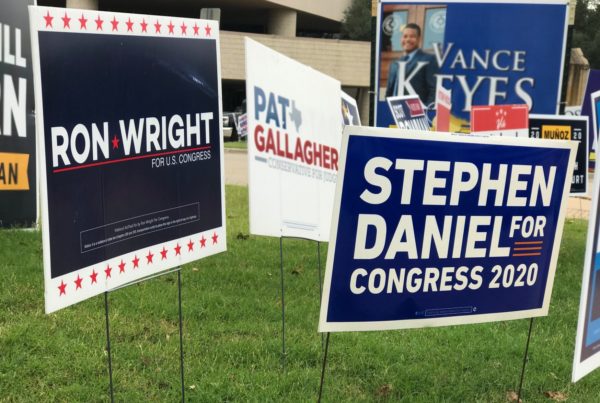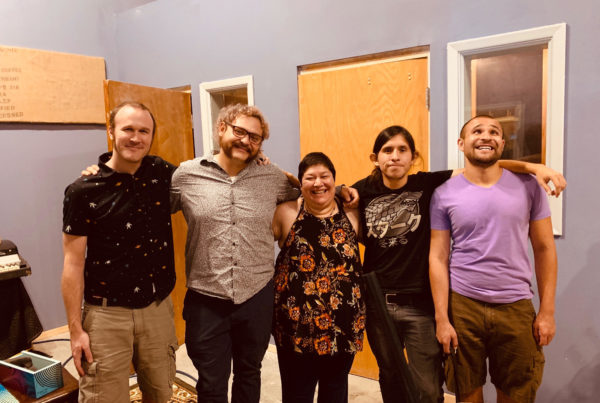From KERA:
Before COVID-19 devastated the music industry and left local artists without venues to perform in, the Dallas Latinx band of four called Luna Luna was performing their romantic dreamy indie music all across town.
This spring, the band’s members started receiving many updates of cancelled gigs, and 26-year-old Kevin González, Luna Luna’s lead singer, was pretty bummed about their now free schedule.

The Dallas Latinx band Luna Luna. From left to right: Kaylin Martínez (drums), Daniel Muentes (guitar), Kevin González (vocals) and Danny Bonilla (keys, back up vocals).
As the election started ramping up, González says the band started hearing from political organizations, asking Luna Luna to participate in online voter outreach. González, who’s Colombian-American, said this motivated him and the group of North Texas musicians to sing their love tunes “for a good cause, getting people to register to vote.”
“The music itself might not have a political message,” said González. “[But we’re] doing our part to make sure that we get as many people as possible to hit the polls.”
Before then, the band hadn’t taken part in many political activities.
“For so long I was just like ‘I’m not going to talk about it because I don’t want to sound stupid.’ So I think if more people can know they can speak up even when they don’t think that they know all the right words. I think I want to do that,” said Kaylin Martinez, 25, a Mexican-American from Denton and Luna Luna’s drummer. “The past two years I’ve been exploring my beliefs and my political stance.”
In September, Luna Luna performed on an Instagram Live concert called ‘Rock Your Reg,’ a voter registration event that was hosted by MOVE Texas, a political group focused on youth engagement.
González says the band liked having a part in the political process. According to him, Luna Luna represents the young Latinx population and their progressive outlook.
Younger voters like González and Martinez want to be politically engaged, but the global pandemic has brought some challenges. This election has been mostly online, which means approaching voter engagement looks different.
“We’ve never had an election like we’re having right now,” Stephanie Martin, associate professor of political communication at Southern Methodist University said. “We don’t just have the social media environment that we have to think about going into this election. We also have the fact that we have almost literally an entirely digital campaign that is happening before us.”
Although voter engagement is something that is not being done in person right now, the global pandemic has not stopped political organizations from doing what they can to get out the vote.
“We have this new generation of voters that has arrived on the scene,” said Martin. “And Generation X and Baby Boomers are wondering: How are these kids going to think and behave and what is the impact of social media on that?”
According to Tufts University’s Center for Information & Research on Civic Learning and Engagement (CIRCLE), young Texans are leading the nation in voter turnout. As of last week, about half a million Texans under 30 had voted, by absentee ballot, vote by mail or early voting.
“People recognize that there is a real opportunity here to engage and connect with young voters,” said Tomas Rangel, social media strategist for the Texas Democrats.
Activist groups and political parties think high voter turnout from younger people is partly because they’re getting creative online and exploring new platforms. Rangel, who’s Mexican-American and from San Antonio is the Texas Dems’ TikTok personality and his job is to create snappy videos, like an explainer on voting, and recaps of the debates.
“People recognize that there is a real opportunity here to engage and connect with young voters,” said Tomas Rangel, social media strategist for the Texas Democrats.
Activist groups and political parties think high voter turnout from younger people is partly because they’re getting creative online and exploring new platforms. Rangel, who’s Mexican-American and from San Antonio is the Texas Dems’ TikTok personality and his job is to create snappy videos, like an explainer on voting, and recaps of the debates.
“Hi There! Head over to My Texas Votes… and I’ll see you at the polls!” Rangel said in a TikTok post.
More than half of TikTok users are 24 or under. The Texas Dems’ most watched TikTok video has reached over 755,000 views.
“On Twitter you post something and if it gets traction it will get traction within those first 12 hours, but TikTok is wild because you can post something (and) in three weeks it will go viral,” Rangel said. “It’s about creating easy, digestible content so stuff where we break it down a little bit, or maybe we can even go in depth into a certain policy issue.”
“People recognize that there is a real opportunity here to engage and connect with young voters,” said Tomas Rangel, social media strategist for the Texas Democrats.
Activist groups and political parties think high voter turnout from younger people is partly because they’re getting creative online and exploring new platforms. Rangel, who’s Mexican-American and from San Antonio is the Texas Dems’ TikTok personality and his job is to create snappy videos, like an explainer on voting, and recaps of the debates.
“Hi There! Head over to My Texas Votes… and I’ll see you at the polls!” Rangel said in a TikTok post.
More than half of TikTok users are 24 or under. The Texas Dems’ most watched TikTok video has reached over 755,000 views.
“On Twitter you post something and if it gets traction it will get traction within those first 12 hours, but TikTok is wild because you can post something (and) in three weeks it will go viral,” Rangel said. “It’s about creating easy, digestible content so stuff where we break it down a little bit, or maybe we can even go in depth into a certain policy issue.”
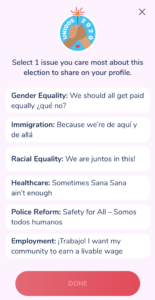
The Latinx dating app Chispa has a feature called Unidos 2020 that lets singles talk about politics and engage in the 2020 election. Screenshot
Dating apps are also taking part in voter engagement. Chispa, a dating app for Latinos, is encouraging singles to head to the polls through the app’s election feature called Unidos 2020, or United 2020. The feature, which was made in partnership with Voto Latino, lets people select what’s most important this election from a playfully-phrased list.
“Healthcare because sana sana sometimes is not enough or for immigration, because we are ni de aquí, ni de allá,” said Julia Estacolchic, Director of Chispa’s Brand and Marketing.
This serves as conversation starters.
“If I am swiping through the deck of options and you and I for example, pick the same topic, it will say that we actually care about the same things,” Estacolchic said.
Chispa has also collected data along the way. From their members in Texas who’ve opted in to this feature, Estacolchic says 34% care about immigration and 25% care about racial equality.
These issues resonate a lot with Latinos like Kevin González, of the band Luna Luna. He says he’s hoping more young Latinos vote this year than ever before.
“I am just thinking about all the people that are getting treated unfairly and could have better things going for them,” González said. “It’s a very important election and you don’t want to look back maybe two years from now and think to yourself ‘no i don’t like what’s going on around me. I wonder if I voted if something could have changed.’”
Got a tip? Alejandra Martinez is a Report For America corps member and writes about the economic impact of COVID-19 on marginalized communities for KERA News. Email Alejandra at amartinez@kera.org. You can follow Alejandra on Twitter @_martinez_ale.




